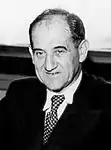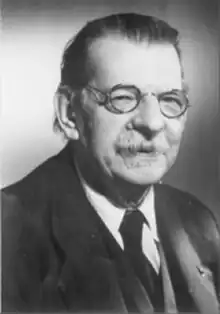| |||||||||||||||||||||
Electoral college of France | |||||||||||||||||||||
|---|---|---|---|---|---|---|---|---|---|---|---|---|---|---|---|---|---|---|---|---|---|
| Registered | 81,764 | ||||||||||||||||||||
| Turnout | 99.42% | ||||||||||||||||||||
| |||||||||||||||||||||
| |||||||||||||||||||||
The 1958 French presidential election was the first of the French Fifth Republic and took place on 21 December. It was the only French presidential election by the electoral college (gathering the members of the French Parliament, the Conseils Généraux, the overseas assemblies, and tens of thousands of mayors, deputy mayors and city council members). To win, a candidate was required to receive 50% of the vote. This system was used only for this election.[1][2][3]
Charles de Gaulle, who became President of the Council of Ministers after the May 1958 crisis during the Algerian War, won in the first round of voting with 78.5% of the votes cast against Georges Marrane of the French Communist Party and Albert Châtelet of the Union of Democratic Forces.[4] De Gaulle took office the following month, and after a 1962 referendum, established direct universal suffrage for presidential elections.[5]
See also
References
- ↑ Philip Thody (1989). French Caesarism from Napoleon I to Charles de Gaulle. Palgrave Macmillan UK. pp. 105–. ISBN 978-1-349-20089-4.
- ↑ "Constitution du 4 octobre 1958 - Texte originel - Sénat". www.senat.fr. Retrieved 2021-04-13.
- ↑ Philip Thody (1989). French Caesarism from Napoleon I to Charles de Gaulle. Palgrave Macmillan UK. pp. 105–. ISBN 978-1-349-20089-4.
- ↑ Condette, Jean-François Condette (2009). Roger, Philippe (ed.). Le Nord-Pas-de-Calais en 1958. Histoire de l'Europe du Nord-Ouest (in French). Villeneuve-d'Ascq: IRHIS, CEGES, Université Charles de Gaulle-Lille 3. ISBN 978-2-905637-60-4.
- ↑ Susana Galera (1 January 2010). Judicial Review: A Comparative Analysis Inside the European Legal System. Council of Europe. pp. 71–. ISBN 978-92-871-6723-1.
.jpg.webp)

